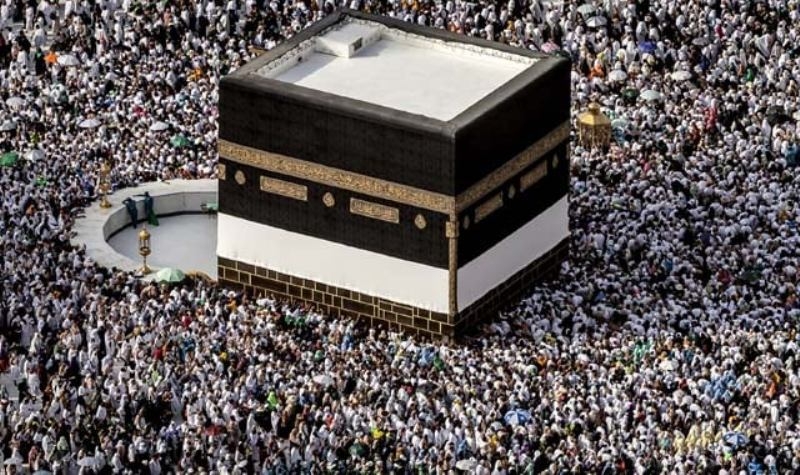- Myanmar: UN chief for urgent access as quake toll mounts |
- AI’s $4.8 tn future: UN warns of widening digital divide |
- Volker Turk warns of increasing risk of atrocity crimes in Gaza |
- Ultimate goal is to join ASEAN as full member, says Dr Yunus |
- South Korea President Yoon Suk Yeol removed from office |
Million-plus begin hajj pilgrimage under shadow of Gaza war

Hajj pilgrimage begins from the holy City of Makkah in Saudi Arabia.
Makkah, Saudi Arabia, June 14 - More than a million Muslim pilgrims were in Makkah Friday for the start of a hajj pilgrimage held against the grim backdrop of the Gaza war and in exhausting summer heat.
Crowds of robed worshippers will circle the Kaaba, the black cubic structure at Makkah's Grand Mosque, with many expressing sadness eight months into the Israel-Hamas war.
"Our brothers are dying, and we can see it with our own eyes," a tearful 75-year-old Zahra Benizahra from Morocco told AFP.
Belinda Elham of Indonesia, which has the world's largest Muslim population, said she would "pray every day so that what's happening in Palestine ends".
The war in Gaza was triggered by Hamas's unprecedented attack on southern Israel on October 7, which resulted in the deaths of 1,194 people, mostly civilians, according to an AFP tally based on Israeli official figures.
The militants also seized 251 hostages. Of these, 116 remain in Gaza although the army says 41 of them are dead.
Israel in response has carried out a military offensive in Gaza that has left at least 37,232 people dead, also mostly civilians, according to the health ministry in the Hamas-ruled territory.
Saudi King Salman issued a decree on Monday to host 1,000 pilgrims "from the families of martyrs and the wounded from the Gaza Strip", bringing to 2,000 the number of Palestinian pilgrims to be given the special honour at this year's hajj, the official Saudi Press Agency reported.
However, the Gulf kingdom's minister in charge of religious pilgrimages, Tawfiq al-Rabiah, warned last week that "no political activity" will be tolerated, and it was unclear how pilgrims might express solidarity with the Palestinians.
- 'Drink water regularly' -
The hajj, one of the world's largest religious gatherings, involves a series of rituals in Makkah and its surroundings in western Saudi Arabia that take several days to complete.
One of the five pillars of Islam, it must be performed at least once by all Muslims who have the means to do so.
After travelling from all parts of the globe to Islam's holiest city, the pilgrims will first perform the "tawaf" -- circling seven times around the Kaaba.
They will then head towards Mina, a valley surrounded by craggy mountains several kilometres (miles) outside Makkah, where they will spend the night in air-conditioned tents.
The climax will come on Saturday with day-long prayers on Mount Arafat, where the Prophet Mohammed delivered his final sermon.
Pilgrims in white garments have already been circling the Kaaba in large numbers for several days.
Some have waited for years for the chance to make the trip, with permits allocated by Saudi authorities on a quota basis for each country.
Nonaartina Hajipaoli, 50, told AFP she felt privileged to be among the 1,000 pilgrims who came this year from Brunei in Southeast Asia.
"I'm speechless, I can't describe what I feel," she said.
Last year's hajj drew more than 1.8 million pilgrims, according to official figures, after authorities lifted pandemic-era restrictions and scrapped age limits.
About 1.5 million had arrived by late Monday for this year's hajj, official media said.
As has been the case for several years, the gathering falls this year during the hot Saudi summer, with officials predicting average highs of 44 degrees Celsius (111 degrees Fahrenheit).
Mohammed al-Abdulali, spokesperson for the Saudi health ministry, told AFP this week there were more than 10,000 documented cases of heat-related illnesses last year, 10 percent of which were heat stroke.
Mitigation measures this year include misting systems and heat-reflective road coverings.
A text message sent to pilgrims on Thursday instructed them to "drink water regularly, more than 2 litres daily" and to "always carry an umbrella", warning that temperatures could climb to 48 degrees Celsius. - AFP

